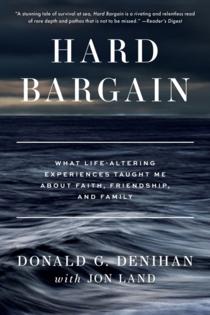Near-death experiences provide author a new lease on life
Published in Mom's Advice
“Life isn’t tied with a bow, but it’s still a gift.”
That nugget was the last item in a list of 45 life lessons offered by Regina Brett, legendary newspaper writer for the Cleveland Plain Dealer.
It’s also the last sentence in Donald G. Denihan’s new book "Hard Bargain" (Stillwater Press), best described as part gripping true adventure story and part self-reflection on how three near-death experiences helped him get a better grasp on what is really important in life.
While Denihan did in fact have three life-threatening events in his life, Hard Bargain focuses on two: an accident on a duck hunting trip close to home as a youth, and a fishing trip in the Bahamas that goes haywire.
When a rifle inadvertently goes off hitting Denihan in the foot while out duck hunting, first there’s the matter of somehow getting help and finding his way back to safety, and then in the hospital complications surface that extend the impact beyond his foot. “I drifted in and out of consciousness, but my first lucid memory was of asking anyone if I was going to die. No one would answer me.”
Rehabilitation gave the young boy ample time to contemplate his fate. For one thing, he discovered the value of friendship, as far more classmates came by to visit than he ever would have expected. While it’s hard for a teenager to process, he also started to wonder whether he had taken life for granted and began to defy his medical experts’ opinions and achieve physical goals beyond expectations.
Also, it was a spiritual awakening. “I had to embrace and accept my faith without preconditions and not see believing as a transaction between me and God. That would have been an especially heavy lift for a 16-year-old boy who’d been wheeled into the hospital but not so for a 16-year-old boy who was wheeled out.”
The heart of the narrative, however, skips to Donald as a grown man, successful in real estate and the hotel industry, about to embark on a fishing vacation that takes the author, his dear friend Gene, and their guide Alfred to a remote island 30 miles off the mainland in a small skiff in search of bonefish.
The story unfolds like a Hollywood disaster movie. Only difference: this one is all too real.
“The wind had kicked up another notch, and the rain had turned into a light mist. It cooled me off after the warm adrenaline rush I felt after battling the bonefish, but I didn’t think Gene noticed the weather.”
That light mist turns into torrential rains and winds. Out of gas, with limited communication and ability to see, and bobbing in the cold waters after their boat capsizes, the three struggle to survive. Not the slightest hint of rescue. Will they all make it?
Once again, this time, in far more compromising circumstances, hanging on to part of their skiff for dear life, Donald is reflective, trying to wash away his physical challenge, reflect on the goodness of his life, and find peace.
“A helpless feeling comes over you when you’re on the water getting battered by a storm. You start to grasp the awesome power of the sea…I felt the first twinges of despair creep into my heart…With no other options, I began to pray quietly.”
Later on, the traumatic incident prompted Denihan to want to help others in dire straits, in situations and conditions that might have been out of their control. So he created the God Is Good fund, a 501© (3) to help people in need. The fund allowed for the rebuilding of homes and lives for several needy families.
"Hard Bargain," named, incidentally, after the capital of Moore’s Island, where Denihan went to fish, is an exciting true adventure made more impactful by the lessons presented to and by the author. Readers will get caught up not only in the story but in getting a behind-the-scenes snapshot of how a person behaves, thinks, feels, reflects and responds in times of great distress.
The entire experience helped Denihan put things in their proper perspective.
“Too many people want to put a dollar sign on everything, perceiving everything as transactional instead of placing the greatest value in the relationships and interactions that define us as people. You can’t put a dollar sign on love, or happiness, or family, or friendship, or loyalty, but they are worth more than anything that comes with a price tag attached.”
Now there’s a message that is priceless.










Comments